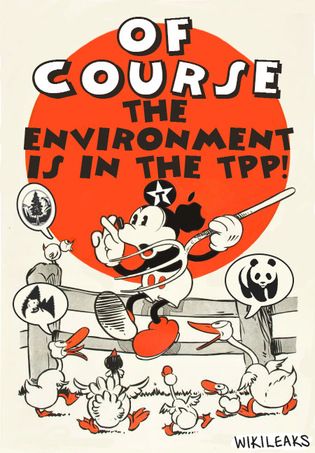(10 am. – promoted by ek hornbeck)
WikiLeaks has released the secret draft text for the entire Trans Pacific Partnership Agreement (TPP) Environment Chapter and the corresponding Chairs’ Report.

The Environment Chapter covers what the Parties propose to be their positions on: environmental issues, including climate change, biodiversity and fishing stocks; and trade and investment in ‘environmental’ goods and services. It also outlines how to resolve enviromental disputes arising out of the treaty’s subsequent implementation. The draft Consolidated Text was prepared by the Chairs of the Environment Working Group, at the request of TPP Ministers at the Brunei round of the negotiations.
When compared against other TPP chapters, the Environment Chapter is noteworthy for its absence of mandated clauses or meaningful enforcement measures. The dispute settlement mechanisms it creates are cooperative instead of binding; there are no required penalties and no proposed criminal sanctions. With the exception of fisheries, trade in ‘environmental’ goods and the disputed inclusion of other multilateral agreements, the Chapter appears to function as a public relations exercise. [..]
The Chairs’ Report of the Environment Working Group also shows that there are still significant areas of contention in the Working Group. The report claims that the draft Consolidated Text displays much compromise between the Parties already, but more is needed to reach a final text. The main areas of contention listed include the role of this agreement with respect to multilateral environmental agreements and the dispute resolution process.
According to analysis by The New York Times, the Obama administration has backed off support of strong environmental protections under pressure from various emerging nations in Asia, who fear that things like pollution controls will make it more difficult for them to develop their economies.
As it stands now, the documents, viewed by The New York Times, show that the disputes could undo key global environmental protections.
The environmental chapter of the trade deal has been among the most highly disputed elements of negotiations in the pact. Participants in the talks, which have dragged on for three years, had hoped to complete the deal by the end of 2013.
Environmentalists said that the draft appears to signal that the United States will retreat on a variety of environmental protections – including legally binding pollution control requirements and logging regulations and a ban on harvesting sharks’ fins – to advance a trade deal that is a top priority for Mr. Obama. [..]
The report indicates that the United States has been pushing for tough environmental provisions, particularly legally binding language that would provide for sanctions against participating countries for environmental violations. The United States is also insisting that the nations follow existing global environmental treaties. [..]
As of now, the draft environmental chapter does not require the nations to follow legally binding environmental provisions or other global environmental treaties. The text notes only, for example, that pollution controls could vary depending on a country’s “domestic circumstances and capabilities.”
The Director of Sierra Club’s Responsible Trade Program, Ilana Solomon released this message about the weak standards and calling on readers to tell congress to reject fast track legislation:
The leaked environment chapter is unenforceable and rife with weak language, according to an analysis of the leaked text by the Sierra Club, WWF, and NRDC.
The leaked environment chapter text falls flat on the standard for environment chapters from the past seven years. Since the May 2007 bipartisan consensus (pdf) on trade by the Bush administration and Congress, the environment chapters of all U.S. free trade agreements have been legally enforceable and included a list of environmental treaties that countries committed to uphold. Today’s leaked text-which is both unenforceable and does not include obligations to uphold commitments made under environmental treaties-does not meet the standard set by Congress.
As Michael Brune, executive director of the Sierra Club stated, “If the environment chapter is finalized as written in this leaked document, President Obama’s environmental trade record would be worse than George W. Bush’s. This draft chapter falls flat on every single one of our issues – oceans, fish, wildlife, and forest protections – and in fact, rolls back on the progress made in past free trade pacts.” [..]
The current state of the environment chapter is completely unacceptable. It’s unbelievable to think that TPP countries have agreed to allow foreign corporations to attack public interest policies in private trade tribunals, but they can’t agree to a binding environment chapter with strong commitments to help protect natural resources.
This text proves why so many Members of Congress don’t want to give the president “fast-track” authority that could help rush the TPP over the finish line with almost no Congressional input. Tell Congress to reject fast track-legislation that would strip Congress of its own ability to ensure that the TPP, including the environment chapter, actually protects communities and the environment. And the TPP governments must stop pandering to the interest of big corporations and get serious about protecting families and the environment.
Both House Minority Leader Nancy Pelosi (D-CA) and Senate Majority Leader Harry Reid (D-NV) are opposed to fast track of the TPP. Ms. Pelosi told reporters that she has a problem with the lack of transparency, “We want transparency. We want to see what’s going on there.”

1 comments
Author